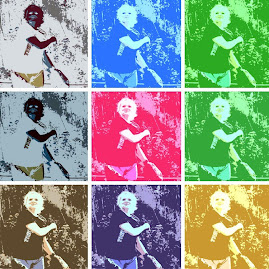Tuesday, February 16, 2010
Final Thoughts
When I started this class, I was aware of a few of the Web 2.0 tools. I had heard about Facebook, Twitter, Blogger and Flickr. Out of those, I only had used Blogger and Facebook. Everything else was new. I'm still not sure of how to go about using Mashup. I think having more time during class for hands-on would have been helpful. There were definitely many different levels of knowledge in this class. Perhaps going to 2 hours per class would be more beneficial. I really enjoyed trying the trading card and will explore that more as time permits. I am glad to have been exposed to these tools.
Trading Cards
I can see where students could have a lot of fun. I'm still trying to figure all of this out. I'm trying to determine how I could incorporate it in one or two other classes I'm taking.
RSS Feed
I wasn't sure how this would work or if I would find it useful. I like having lots of sites that I visit almost daily in one place. I have to get in the habit of checking it daily. One of the RSS feed is FOXNews.com. to be able to read the articles and not have to search it great!!
Tuesday, January 26, 2010
Copyright article
The article that I read for the assignment was Website Linking Issues”.
The first part of the article discussed the copyright legality of created lists of links. An example of a noncopyrighted list was the phone book. Since the phone is a list of names, addresses and phone numbers in alphabetical order, it would not be considered protected. There is no originality in the alphabetical arrangement.
In order to have a possibility of have the list protected, when creating the list of links, there needs to be some evidence that some original thought was used. According to the article, if the list took hours and hours and hours of hard work to create, then the compiled list would be protectable.
The next point discussed in the article was the linking from one website to another. The Web is available to anyone who has the necessary technology to access it. There is an unwritten doctrine of implied public access on the Web. This means that by putting your work on the Web, you have given granted implicit permission for anyone to create a link to your URL.
What happens when a less than desirable website links to your website? According to an Editorial in Web Week, July, 1995, you are responsible to monitor the links that are linked to your website. In order to do that, you would have to search through the web for references to your site, examine where incoming traffic is linking from and ask sites to get prior permission before linking. Even doing this may not be enough. Using netiquette, removing links when ask to, is what one would need to do.
The last point discussed composite pages. A composite page is a page “that takes different elements from diverse pages or servers to create a new webpage”. The page doesn’t actually contain the elements; the elements are actually link in. The composite page directs the browser to go to the original source to obtain the graphics and other desired elements.
I agree with the author of the article. If you want to link to a site or anything on a webpage, seeking permission is the right thing to do. I’ve seen statements on various websites that grant linking privileges. Unfortunately, too many people, adult and students alike, think the Internet is free game and that their identity is safely unknown.
The first part of the article discussed the copyright legality of created lists of links. An example of a noncopyrighted list was the phone book. Since the phone is a list of names, addresses and phone numbers in alphabetical order, it would not be considered protected. There is no originality in the alphabetical arrangement.
In order to have a possibility of have the list protected, when creating the list of links, there needs to be some evidence that some original thought was used. According to the article, if the list took hours and hours and hours of hard work to create, then the compiled list would be protectable.
The next point discussed in the article was the linking from one website to another. The Web is available to anyone who has the necessary technology to access it. There is an unwritten doctrine of implied public access on the Web. This means that by putting your work on the Web, you have given granted implicit permission for anyone to create a link to your URL.
What happens when a less than desirable website links to your website? According to an Editorial in Web Week, July, 1995, you are responsible to monitor the links that are linked to your website. In order to do that, you would have to search through the web for references to your site, examine where incoming traffic is linking from and ask sites to get prior permission before linking. Even doing this may not be enough. Using netiquette, removing links when ask to, is what one would need to do.
The last point discussed composite pages. A composite page is a page “that takes different elements from diverse pages or servers to create a new webpage”. The page doesn’t actually contain the elements; the elements are actually link in. The composite page directs the browser to go to the original source to obtain the graphics and other desired elements.
I agree with the author of the article. If you want to link to a site or anything on a webpage, seeking permission is the right thing to do. I’ve seen statements on various websites that grant linking privileges. Unfortunately, too many people, adult and students alike, think the Internet is free game and that their identity is safely unknown.
Subscribe to:
Posts (Atom)


